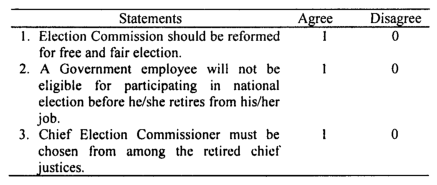The choice of an evaluator or an evaluation team is an essential factor in the whole process of evaluation. Evaluations are conducted either by an internal evaluator or by an external evaluator, or are often the case, by a combination of both.
Careful consideration of the purposes of the evaluation will help in the determination of the best approach.
Internal evaluations are conducted by evaluators who are associated with the program to be evaluated.
In contrast, the external evaluations are performed by evaluators who are not associated with the program being executed, implemented, and funded.
Sometimes, national consultants are appointed as a helping hand for project evaluation. This practice is usually effective and can significantly enrich the evaluation exercise.
A competent consultant understands the evaluation context and may provide the evaluation team with access to officials and sources of information that otherwise may not be available.
Moreover, the inclusion of a national consultant on a team can act as a catalyst for greater local “buy-in” into the evaluation results.
We summarize below the possible advantages and disadvantages of deploying internal and external evaluators.
Advantages of Internal Evaluation
- An internal evaluator is familiar with the organization, its program and operations, and its aims and objectives. This is expected to pose less threat of anxiety and disruption;
- Sometimes people are more willing to speak to insiders than to outsiders;
- An internal evaluation is very clearly a management tool, a way of self-correcting, and much less threatening than an external evaluation. This may make it easier for those involved to accept findings and criticisms.
- An internal evaluation will usually cost less than an external evaluation;
- An internal evaluation does not require time-consuming recruitment negotiations;
- An internal evaluation contributes to strengthening national evaluation capability.
Disadvantages of Internal Evaluation
- The evaluation team may have a vested interest in reaching positive conclusions about the project or organization. For this reason, other stakeholders, such as donors, may prefer an external evaluation;
- The evaluation team may not be sufficiently knowledgeable, skilled, or trained in evaluation;
- While it may cost less than an external evaluation, the opportunity cost of the internal evaluation may be high;
- The evaluation team may not have special subject matter expertise, thus rendering the internal evaluation exercise at risk.
Advantages of External Evaluation
- The external evaluation team is likely to be more objective as the evaluators will have some distance from the work. This may reduce organizational bias;
- The external evaluation team will have more exceptional evaluation skills and technical expertise in conducting an evaluation;
- Sometimes, people are more willing to speak to outsiders than to insiders;
- The use of an outside evaluator gives more credibility to findings, particularly positive results;
- An outside evaluator can dedicate full time to the evaluation;
- An external evaluator can bring the organization into contact with additional technical resources because of their increased exposure to the outside world.
Disadvantages of External Evaluation
- An external evaluator may not know the organization, its policies, procedures, and personalities;
- An external evaluator may be unfamiliar with the local political, cultural, and economic environment;
- In external evaluation, those who are directly involved may feel threatened by outsiders and be less likely to talk openly and cooperate in the process;
- External evaluation can be a very costly undertaking;
- An external evaluator may misunderstand what you want from the evaluation and will not provide you with what you want;
- An external evaluation requires more time for contact, negotiations, orientation, and monitoring.
How do you choose an external evaluator or evaluation team?
If it is felt that an external evaluation is called for, then you will need to delineate some criteria for this purpose.
The following is a tentative list of qualities that you may look for in an external evaluator or evaluation team:
- An evaluator (or an evaluation team) must have an understanding of the development and organizational issues with adequate experience in evaluating development projects, programs or organizations;
- An evaluator must have enough research skills with a firm commitment to quality and meeting deadlines;
- An evaluator must be objective, honest, and fair;
- An evaluator will have the ability to communicate verbally and in writing and have a style and approach that best fits with the organization for which he will work.
What are the advantages of an internal evaluation?
Advantages of internal evaluation include familiarity with the organization and its objectives, posing less threat of anxiety and disruption, being a clear management tool, usually costing less than an external evaluation, not requiring time-consuming recruitment negotiations, and contributing to strengthening national evaluation capability.
What are the potential disadvantages of an internal evaluation?
Disadvantages of internal evaluation include potential vested interests in positive conclusions, lack of sufficient knowledge or training in evaluation, high opportunity costs, and possibly lacking special subject matter expertise.
Why might an external evaluation be considered more credible?
An external evaluation might be considered more credible because the external evaluation team is likely to be more objective, reducing organizational bias. Additionally, the use of an outside evaluator gives more credibility to findings, especially positive results.
What are the drawbacks of an external evaluation?
Drawbacks of an external evaluation include potential unfamiliarity with the organization and local environment, possible threats felt by insiders, higher costs, misunderstandings regarding evaluation expectations, and additional time required for contact, negotiations, and orientation.
What qualities should one look for in an external evaluator or evaluation team?
Qualities to look for in an external evaluator include understanding of development and organizational issues, adequate evaluation experience, research skills, commitment to quality and deadlines, objectivity, honesty, fairness, and effective communication skills.
How can the inclusion of a national consultant benefit the evaluation process?
The inclusion of a national consultant can enrich the evaluation exercise, as they understand the evaluation context and can provide access to officials and information sources. Their inclusion can also promote greater local “buy-in” into the evaluation results.

